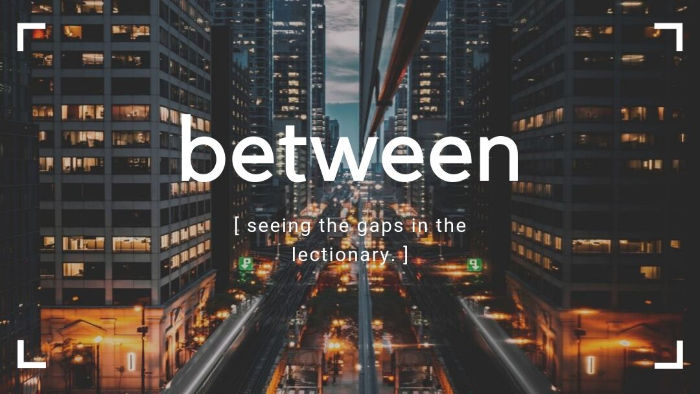
A look at the gaps in the lectionary.
This week: the gap between Proper 28A and 29A
The text: none [we’re still in Matthew 25]
When I first started this series, the point was to fill in the gaps. Those times when the lectionary skips stories, leaving us to catch up with the context.
Of course, there wasn’t always a gap in the lectionary, so sometimes I didn’t need to run a post out.
And given that we have had so few gaps in the lectionary in the last couple of months, it seems as if there would be nothing to write.
And yet, if you’ve followed me through this season, you know exactly why the context does matter. And keeping track of the whole story is just as important as noticing what’s missing.
This week’s gospel comes straight from the last one. So, there is no gap. But without the context, we’d lose a lot.
The Culmination
This last part of Matthew 25 is the culmination of five chapters worth of Jesus’s experience in Jerusalem. His confrontations, his rebukes and prophecy. His dark parables.
And unlike all of the stuff that came before it, this one makes sense without the context. We get this one.
In all of those places when we have ignored the downtrodden, we’ve ignored Jesus.
But knowing that this is the teaching that informed the immediately preceding parables of the bridesmaids and the talents utterly changes the way we see them if we had read them out of context. And even for many who read them in context!
From the first question of authority to the questions of rules and commands, Jesus is directing their attention, not just to the question of God’s authority or the authority we exercise on God’s behalf, but how we use it and upon whom.
The real gap in the lectionary
It’s our sense of ownership over our actions. Which, I think, is the real villainy of reading the dark parables without their context—and without this final teaching. We’re bound to hear them as promoting personal responsibility, investment, and preparation. And not our community’s responsibility.
The danger of our “do the right thing” mentality is that it separates us from having any connection at all with the people around us.
So when we get to that final question, we are like the disciples wondering, well, when did we see you suffering, Jesus?
Because the implication is that if we had known, we would have done something. The dependent clause ensuring our lack of personal responsibility for activity in the world.
If I had known!!!
But if we had been listening the whole time, we would know!
This was the point. It shouldn’t be a shocking reversal in Matthew 25. It should be more like an I knew it!
That my being a good person is related to the existence of suffering around me. Not just whether I helped, but how much I am able to pretend that suffering doesn’t even exist relative to me.
